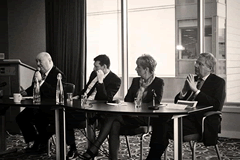One of the details of the deal that Greater Manchester has done with government to achieve its outstanding devolution package is that the Combined Authority will appoint an interim ‘eleventh leader’ who will chair the organisation through to the transition that will see the city region elect a metro mayor.
It has been largely assumed that the ‘interim’ chairman would come from the existing group of council leaders who make up the Combined Authority. However I understand that it is now more likely that an additional person will be appointed to head the organisation for the next two years.
This got me thinking about the impasse that has been reached here in the Liverpool city region, and whether the appointment of a ‘seventh leader’ for our Combined Authority may assist in breaking through what is becoming another bun fight among the six men who currently run Merseyside. This latest Liverpool drama, with the pro and anti- metro mayor campaigns becoming increasingly vociferous and antagonistic, has left the rest of us as frustrated by-standers who can only watch with a combination of admiration and disappointment as the civic leaders of Manchester trail blaze on the devolution agenda; whilst Liverpool’s six Labour leaders fall out very publically on an almost daily basis.
What value could a ‘seventh’ leader add? Well perhaps if it was the right personality they could act as a much needed negotiator in an increasingly bitter battle that sees Liverpool and Sefton up against Wirral, St Helens, Halton and Knowsley in an almighty row over the notion of a metro mayor for Greater Liverpool.
A new face, a fresh pair of eyes, and if at all possible a character who would command the respect of all parties would surely only help what is becoming a debilitating disagreement among the city region leadership.
Identifying who that man or woman is and getting unanimous support for that person could prove as equally fractious, but I think it’s worth a discussion. There are certainly no shortage of candidates, though they may not thank me for suggesting their involvement in what external observers perceive as a ‘permanent and typical Liverpool problem’.
The MP for Wirral West and Employment Minister Esther McVey has the ear of ministers and would be well placed to act as an influential and, in the Labour leader’s case, non-partisan chair. She could give the Combined Authority the benefit of her ‘inside’ knowledge as to what Chancellor Osborne really needs to relinquish additional powers and resources; and draw on her experience as an entrepreneur in the city region when she will well recall the bewilderment the private sector feels when this type of nonsensical row is going on.
Another potential parliamentarian who would be eminently qualified to play a part in progressing the devolution debate is Liverpool Riverside MP Louise Ellman. Currently the well- respected chair of the influential Transport select committee in Westminster, as the former Leader of Lancashire County Council and a strong advocate of regional devolution for the Northwest over a twenty year period, there are few politicians who know their way around local government and the potential prize- and pitfalls- of the devolution deal that is being offered than Mrs Ellman.
Of course a less radical approach would be to appoint an individual already involved in the existing structures of Merseyside governance, and that would open the door for the chair of the Local Enterprise Partnership Robert Hough, or the talented head of Mersey Travel Councillor Liam Robinson.
The chances of this ‘seventh leader’ option being adopted are slim, to say the least. But in the absence of any positive movement on an issue that is the most important the city region will face politically in a generation, we need to do something that will break the existing log-jam. Does anyone else have a better idea?




